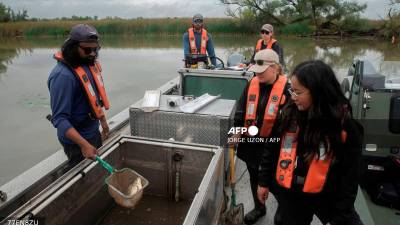DUNNVILLE: Americans and Canadians have found common cause in battling invasive carp species described as ferocious eating machines threatening the Great Lakes ecosystem.
President Donald Trump and his Democratic opponents have joined Canadian authorities in addressing the threat posed by these voracious fish originally introduced to the United States in the 1970s.
Aquatic biologist Trisiah Tugade from Canada’s Invasive Carp Program described the fish as eating machines during her team’s monitoring mission along the Grand River, a Lake Erie tributary.
Invasive carp can consume up to 40% of their body weight daily and were initially introduced to control nuisance algae in confined aquaculture ponds.
The fish escaped during floods and spread northward through river systems including the Illinois River toward the Great Lakes.
University of Michigan water policy expert Mike Shriberg stated that ecologists fear the devastating impact if Asian carp establish breeding populations in the Great Lakes.
Canadian experts conduct annual searches in Great Lakes tributaries with conditions favorable for carp spawning and feeding.
Tugade and senior biologist Alex Price recently supervised an electrofishing mission using non-lethal electrical charges to temporarily stun fish for identification.
The program has captured only a few dozen invasive carp in Canadian waters since its 2012 launch according to monitoring data.
Commercial fisherman James Hall recalled his surprise at catching one of the unusual fish a decade ago and immediately reporting it through the government’s carp hotline.
Price emphasized the importance of continued vigilance despite the rarity of catches in Canadian waters.
He explained that invasive carp can breed multiple times annually and produce hundreds of thousands of eggs per spawning event.
The fish grow rapidly and can exceed the size that natural predators can consume within their first year of life.
Shriberg described the Great Lakes as unifiers across political parties and between neighbouring nations.
Lakeshore states including Michigan, Ohio, Pennsylvania and Wisconsin have maintained bipartisan support for protecting the Great Lakes from invasive species.
Trump’s May White House memo supporting efforts against the economic and ecological threat of invasive carp received cross-party praise.
Shriberg noted the memo affirmed the rare bipartisan consensus on Great Lakes protection policy during politically contentious times.
The cooperative path forward faces uncertainty due to trade tensions and annexation threats that have strained US-Canada relations.
The Trump administration has reportedly sought to revise treaties governing the shared Great Lakes waterway.
Shriberg warned that the administration’s hostility toward Canada threatens to undermine long-standing cooperative management of the water system.
Failure in the battle against invasive carp would have dire and unpredictable ecological consequences for the region.
The expert stated that established carp populations in the Great Lakes would likely become impossible to eliminate completely. – AFP
